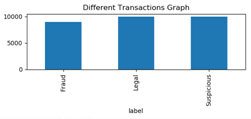A Novel Method of Fraud Detection of Credit Cards by Fuzzy, LSTM, and PSO Optimization
Main Article Content
Abstract
Since online shopping has become so popular, credit card theft has skyrocketed. This makes it hard to spot fake charges on accounts. In this research, credit card fraud detection is performed using a fuzzy database. It has been considered a data mining challenge to reliably identify whether or not a transaction is legitimate. This paper discusses the LSTM method and fuzzy logic. The learning process was sped up and made more precise by using a technique called particle swarm optimization (PSO). Performance values have been compared with those of the LSTM and fuzzy logic techniques, and a PSO-based neural network has been intensively trained by increasing the number of iterations and the population, or number of swarms. It has been shown that the PSO-based algorithm yields the best result for detecting fraudulent transactions. The goal of this method is to lower the mean square error (MSE) rate of the system. PSO is a popular optimization technique that can be used to locate the optimal set of features for the credit card fraud detection system. The proposed method PSO shows less mean squared error compared with Fuzzy and LSTM techniques.
Article Details
References
Donato JM, Schryver JC, Hinkel GC, Schmoyer RL, Leuze MR, Grandy NW. Mining multi-dimensional data for decision support. Future Gener Comput Syst. 1999;15:433–41.
Dal Pozzolo A, Boracchi G, Caelen O, Alippi C, Bontempi G. Credit card fraud detection: realistic modeling and a novel learning strategy. IEEE Trans Neural Netw Learn Syst. 2018;29(8):3784–97.
V. Kakulapati, et al., (2021). Fuzzy-Based Predictive Analytics for Early Detection of Disease—A Machine Learning Approach. In: Tuba, M., Akashe, S., Joshi, A. (eds) ICT Systems and Sustainability. Advances in Intelligent Systems and Computing, vol 1270. Springer, Singapore. https://doi.org/10.1007/978-981-15-8289-9_9
Mallinson, H. et al., “Evolving Fuzzy Rules considering Pattern Classification” in International Conference on Computational Intelligence considering Modelling, Control & Automation - CIMCA'99.Vol. 1, IOS Press,1999, pp. 17- 19
Mineda Carneiro, E.; Vieira Dias, L.A.; Da Cunha, A.M.; Stege Mialaret, L.F., "Cluster Analysis & Artificial Neural Networks: A Case Study in Credit Card Fraud Detection," in Information Technology - New Generations (ITNG), 2015 12th International Conference on, April 2015, pp.122-126, 13-15
Tao Guo; Gui-Yang Li, "Neural data mining considering credit card fraud detection," in Machine Learning & Cybernetics, 2008 International Conference on, vol.7, July 2008, pp.3630-3634, 12-15.
S. Maes, K. Tuyls, B. Vanschoenwinkel & B. Manderick, “Credit card fraud detection using Bayesian & neural networks,” in Proceedings of the First International NAISO Congress on Neuro Fuzzy Technologies, 2002
Tripathi K.K. & Pavaskar M.A. “Survey on Credit Card Fraud Detection Methods” in International Journal of Emerging Technology & Advanced Engineering, 2(11), November 2012.
T. T. Nguyen, H. Tahir, M. Abdelrazek, and A. Babar, “Deep learning methods for credit card fraud detection,” 2020 Dec, https://arxiv.org/abs/2012.03754.
Z. Zhang, X. Zhou, X. Zhang, L. Wang, and P. Wang, “A model based on convolutional neural network for online transaction fraud detection,” Security and Communication Networks, vol. 2018, Article ID 5680264, 2018.
Asma Cherif, et al., Credit card fraud detection in the era of disruptive technologies: A systematic review, Journal of King Saud University - Computer and Information Sciences, Volume 35, Issue 1, 2023, Pages 145-174, ISSN 1319-1578,https://doi.org/10.1016/j.jksuci.2022.11.008
Malini, N. & Pushpa, M. (2017). Analysis of credit card fraud identification techniques based on KNN and outlier detection. 255-258. 10.1109/AEEICB.2017.7972424.
V. Kakulapati et al., "A Novel Multimodal risk disease prediction of Covid-19 by Using Hierarchical LSTM Methods ", "Taylor and Francis book " Data Science and Data Analytics: Opportunities and Challenges". ISBN 9780367628826
V. Kakulapati et al., Risk analysis of coronaviruses caused death by the probability of patients suffering from chronic diseases - a machine learning perspective”, International Journal Critical Reviews. 2020; 7(14): 2626-2633. Doi:10.31838/jcr.07.14.499.
V.Kakulapati et al., “An Intelligent methodology for covid 19 risk prediction using swarms intelligence optimization- A machine learning perspective" Taylor and Francis book "Swarm Intelligence and Machine Learning: Applications in Healthcare". SIMLAH-2021, ISBN 9781032145792, DOI: 10.1201_9781003240037-1, PP: 1-20. Sep 29, 2022

